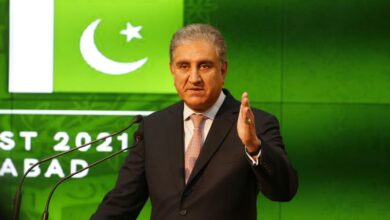Demonstrations across Sri Lanka over arrest of anti-government protesters

Colombo, Aug 9 (EFE).- Hundreds of people demonstrated in Colombo and other parts of Sri Lanka to condemn the crackdown on anti-government protesters and calling for their release on Tuesday, as the GotaGoGama protest site marked four-months since the movement began.
Police have been arresting anti-government protesters for violating court orders and causing damages to public property, especially the Presidential Secretariat.
The Secretariat was occupied by the demonstrators for days before the armed forces forcefully evicted them, although they had voluntarily agreed to vacate the premises.
“I came here to show my support to this protest. We have serious issues. We are losing our jobs, our children’s future is uncertain, and our lives are in danger. We need a change,” Malinda Jayasena, 48, told EFE in Colombo.
The demonstrators were seen carrying placards reading “Stop state oppression” and “Stop Ranil Rajapaksa government’s repression.”
Last week, the police in an announcement urged the protesters to vacate the GotaGoGama site, epicenter of the protests in Galle Face, that has been occupied since Apr.9.
The country’s Attorney General, considering writ petitions filed by protesters, took an undertaking that they would not be removed in the absence of a court order until Aug.10.
However, many protesters have left the site. Several of them told EFE on the condition of anonymity said their main objective was to demand the resignation of then-president Gotabaya Rajapaksa, which they have achieved.
Rajapaksa, who is accused of corruption and human rights violations, resigned after fleeing to Singapore via the Maldives in the face of mass protests last month over the ongoing economic crisis that has been marked by an acute shortage of essential supplies including food, fuel and medicine.
Ranil Wickremesinghe, leader of the United National Party who first took over as prime minister following the resignation of Mahinda Rajapaksa and then served as the acting president, was voted by the parliament as the new president.
However, the protesters have also been calling for Wickremesinghe to step down and hold fresh elections, as his party does not enjoy a significant representation at the parliament, and hence does not have the mandate of the people.
Wickremesinghe, since being sworn-in, has imposed an emergency and cracked down on protesters asking them to stop the demonstrations in an attempt to bring the country back to normalcy.
At the same time, he has also been negotiating a bailout package with the International Monetary Fund and other foreign players, as the country suffers its worst economic crisis since independence from the British empire in 1948.
The nonprofit Human Rights Watch, in a statement Monday, urged the government led by Wickremesinghe to safeguard the rights of the people, and condemned the repeated use of emergency measures since Apr.2.
“President Wickremesinghe faces immense challenges, but imposing draconian emergency regulations, politically motivated arrests of protest leaders, and heightened surveillance of activist groups will not solve Sri Lanka’s dire problems,” said HRW South Asia director Meenakshi Ganguly.
“Sri Lanka’s partners have been clear that international economic assistance will only be effective if the government adheres to human rights and the rule of law and addresses the root causes of the crisis,” she added. EFE
aw/sc





